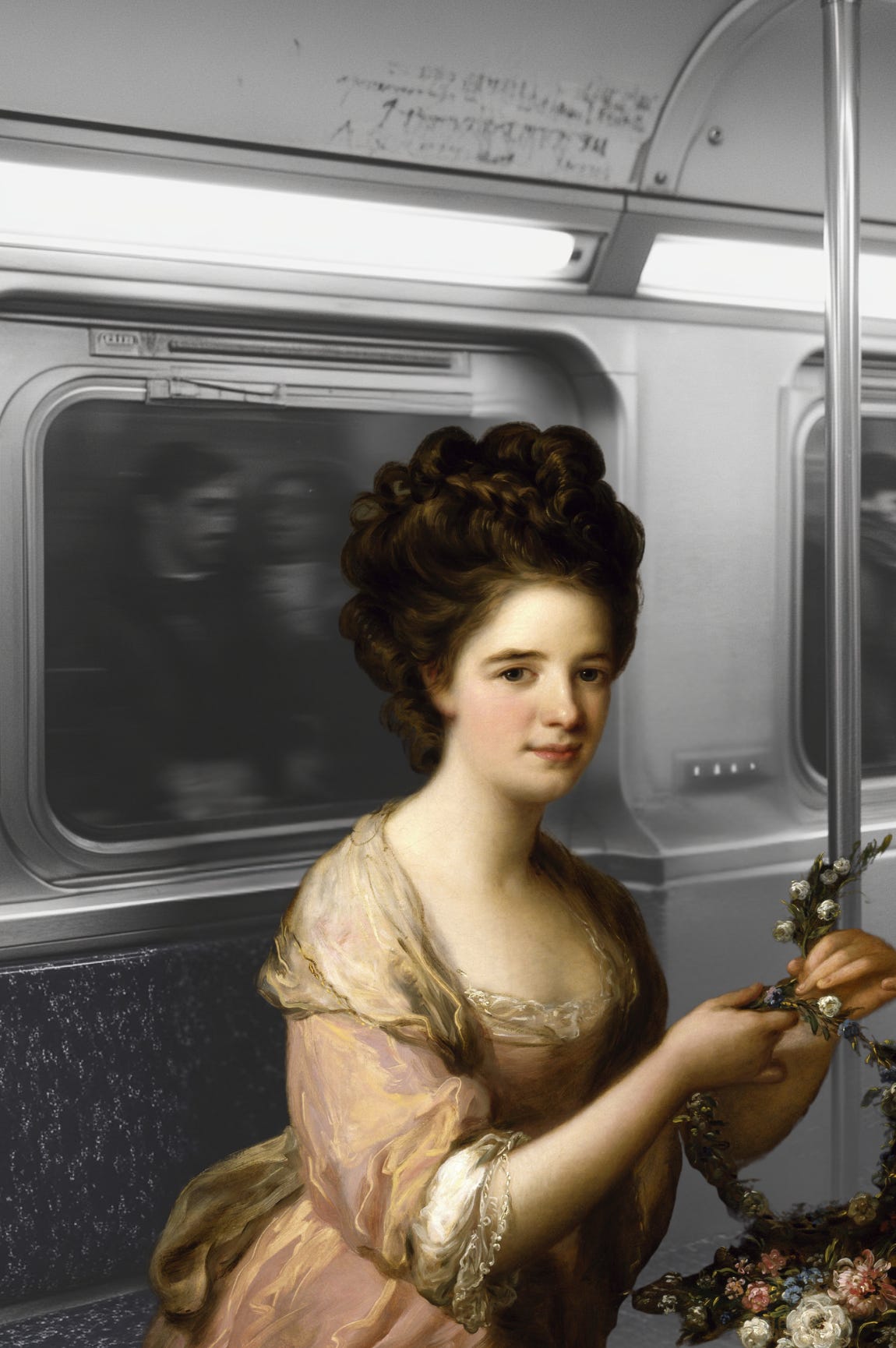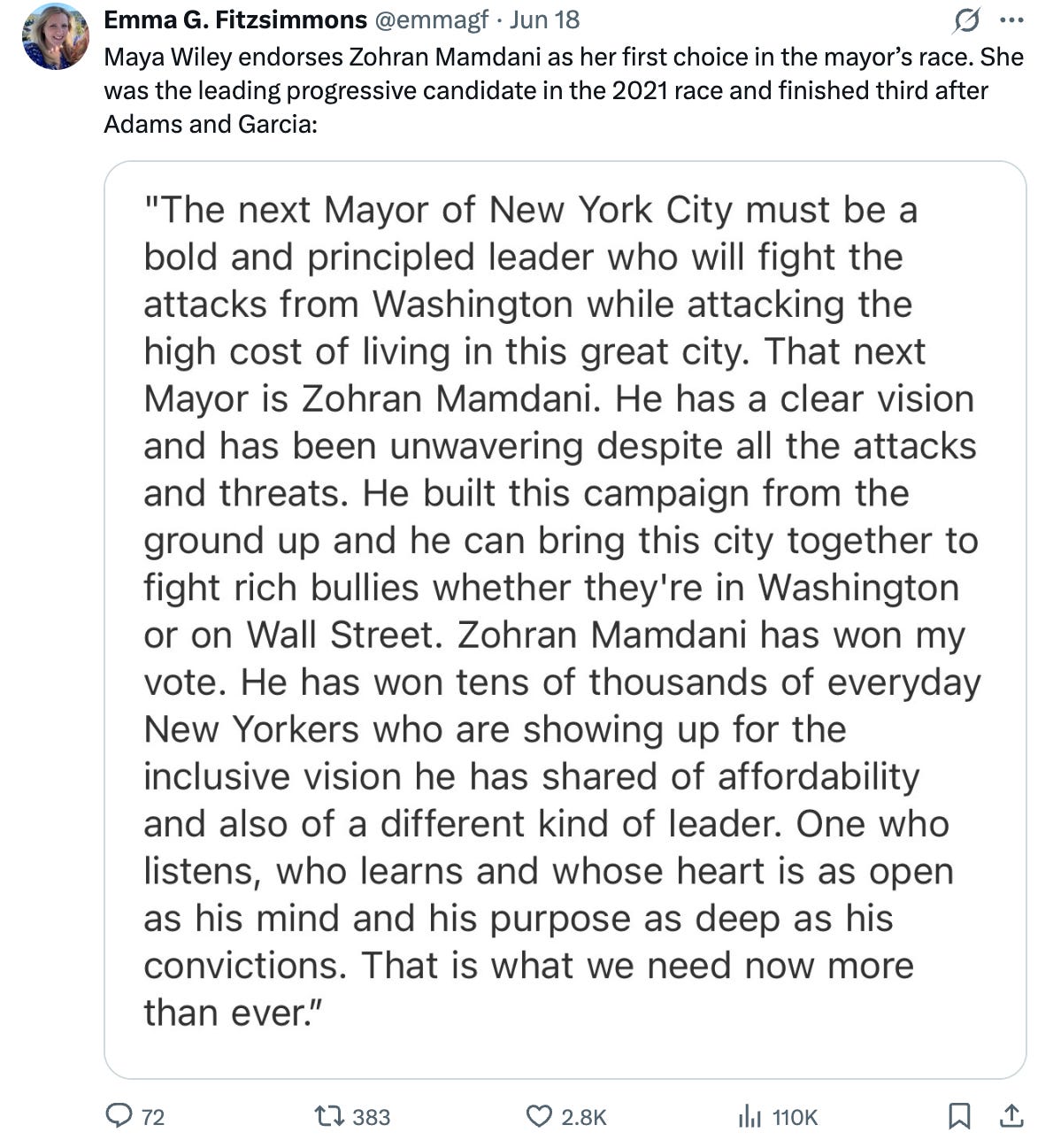is New York City ok??? are they gonna make it??
thoughts on eating the rich and starving the city

There’s a new guy running for mayor of New York City, and he thinks your local bodega should be a government agency. This is not satire.
Zohran Mamdani—a 33-year-old democratic socialist and self-described “poet of the people”—just won the Democratic primary in NYC, toppling the party machine that once backed Cuomo and sending Eric Adams into a full-blown PR bender. Zohran has a theater degree and zero business experience, which is painfully obvious considering his platform reads like a freshman dorm brainstorm that nobody had the heart to veto:
State-run grocery stores
Free public transit
Rent freezes
Billionaire tax hikes
“Food justice,” “climate equity,” and other phrases that feel like they were auto-generated by a gender studies thesis simulator
The crown jewel? A plan to open five city-owned grocery stores, one in each borough.
Not subsidies. Not vouchers. Literal, city-owned supermarkets. One per borough. No rent, no profit, no competition. Just a bureaucratic food distribution system dreamed up by a guy who’s never met a supply chain in his life and administered by the same bureaucracy that brought you potholes, moldy school lunches, and 11-month waitlists for public housing repairs. Central planning, no skin in the game, zero market signals. A five-borough Soviet Safeway run by interns and ideology.
It’s not communism, technically. Mamdani is a democratic socialist. Which means, in theory, he wants to seize the means of production—but only after you vote yes on it. The aesthetic is less gulag, more TikTok mutual aid. More centralized control, less market interference—all dressed up in participatory language and Instagram slideshows. I don’t know why I’m shocked so many people are gobbling it all up.

This is what happens when you let people who’ve never built anything start redesigning entire systems. They confuse commerce with cruelty and think “solving capitalism” means replacing efficiency with slogans.
Because capitalism doesn’t just work—it forces things to work. It rewards competence. It punishes waste. It scales what people actually want, instead of what a city council committee thinks people should eat.
Supporters are calling it a moral corrective to food deserts and corporate consolidation. Critics are calling it f*cking insane.
Can a government that can’t keep the subway rats out of pizza slices really run a five-borough grocery empire? (No.)
But the scariest part isn’t the policy. It’s the optics of sincerity. Mamdani speaks like someone who truly believes the problem with food in New York is not enough bureaucracy.
And in a city where corner stores are already cultural institutions—run with the grit, improvisation, and hustle that defines New York—it’s hard not to wonder what we lose when we try to central-plan character.
(If you’re new here and surprised I’m defending capitalism, you might want to read the big, dirty C-word—it’ll save us all some confusion.)
who is Zohran Mamdani, really?
This isn’t some scrappy working-class hero rising up through the ranks. Zohran Mamdani is the son of a famous intellectual (Mahmood Mamdani) and acclaimed filmmaker (Mira Nair). He went to Bowdoin, majored in theater, and spent much of his early adulthood in elite cultural and activist circles. Which is fine, until he started cosplaying as a grassroots revolutionary.
There’s a certain genre of politician that emerges from these spaces. They speak in the language of struggle, but their lived experience is entirely insulated from the policies they propose. Mamdani has no record of building businesses, managing systems, or doing the kind of ground-level work required to understand operational complexity. But he’s fluent in slogans, and in today’s political culture, that’s increasingly enough.
He doesn’t speak to New York’s working class. He speaks on their behalf, often from a place of distance so wide it might as well be generational. And that’s the real tell: Mamdani’s brand of socialism isn’t about empowering people. It’s about managing them. The grocery store is just the beginning.
but let’s talk about the actual platform:
City-owned grocery stores sound like a cute public sector experiment until you realize what that actually entails: labor unions, procurement hell, food safety bureaucracy, transportation logistics, and a rotating cast of managers protected by layers of bureaucracy, insulated from consequence—because when profit disappears, so does performance incentive. Profit is not the problem—it’s the signal. Remove that signal, and you remove the pressure to keep shelves stocked, prices competitive, and customers satisfied.
Rent freezes don’t help renters. They kill development. When investors know they can’t raise rent, they stop building housing. That’s how you get shortages. That’s how you get black market subleases, deteriorating units, and middle-class flight.
Free public transit? Great—until fare revenue dries up, maintenance gets deferred, and no one feels safe riding it. Just ask San Francisco.
Tax hikes on billionaires and corporations? Who’s going to stay? The people who can’t leave—which means the ones who pay for these fantasy programs are the people least able to afford it.
What Mamdani offers isn’t a plan. It’s a worldview. And at its core is a belief that market signals are morally suspicious, and that if you centralize enough power, you can replace trade-offs with cute little slogans.
the cult of optics —
Mamdani is a case study in aesthetic governance. Everything is symbolic. Every policy is a metaphor. His campaign isn’t selling functionality—it’s selling moral alignment. That’s why it appeals to people who are too ideologically captured to realize they’re cheering for their own decline. People who think good intentions can replace functioning systems—because they’ve never had to run anything themselves.



